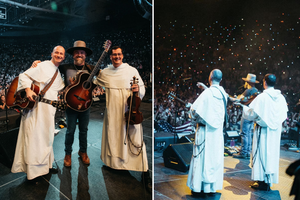Musical Adventures in Beauty, Truth and Goodness
Catholic composer Michael Kurek’s creates sounds of the sacred.

“When we can really give it our full attention, and not while multitasking, music helps us get in touch with the sacred.”
Composer Michael Kurek was speaking to the Register from his Nashville, Tennessee, home on March 19.
“In the Church, we lose a sense of the sacred when music becomes entertainment, with performers up front, both as a detraction from prayer and from preparing ourselves to receive the Eucharist, which is the ‘source and summit’ of why we are there. Beauty was given to us by God as another way to worship and experience him, not as a way to tune him out.”
Kurek is a Catholic revert, one who has returned to the practice of his faith as an adult. He cites St. (Padre) Pio for helping him “to understand that God truly loved and accepted me after I returned to the Church in 2007.” He added that that saint also helped him “to have courage going against the grain of academic music pressures.”
As a professor, Kurek has served for 14 years as chair of the Department of Music Composition at the Blair School of Music of Vanderbilt University in Nashville. While still continuing to teach, he has relinquished the administrative aspect of this position in order to devote himself more fully to composing. It also allows time for his other great passion, namely, to popularize classical music; recently, he started a radio show to that end.
In 2020, Ignatius Press published Kurek’s The Sound of Beauty: A Classical Composer on Music in the Spiritual Life, a reflection on music theory through the lens of Catholic theology. The first appendix of the book offers a “beginner’s play list” for those who want “to develop a taste for classical music, starting with the most tuneful compositions.” Clearly, this is a man on a musical mission.
Noted Musician
While Kurek has many duties in the academic field, he is first and foremost a composer of music. Kurek writes instrumental music for the concert hall. His worldview is Catholic, and that “fundamentally affects” what kind of music he writes. He observes that “a symphony or piano sonata without words can create a whole narrative world in the language of music. Abstract though that may seem, it can pull your spirit forward into a thrilling story with a goal; and I believe that is deeply symbolic of a life desiring the goal of heaven.”
“I wanted to tell that ‘story’ in my own words, my own voice,” Kurek continued, while explaining how he hears music inside his mind that is so compelling that he needs to write it down. “I do not call it special revelation,” he says, “but perhaps it is my subconscious mind having the musical ideas first.” For Kurek, it was listening to Beethoven that first impressed upon him the need for “a strong narrative … so important” to his music, “whatever the style.” He added, “Ravel was important in shaping my tastes for sensitivity and color; Tchaikovsky for melody and shaping an arc of emotion; Bach for the counterpoint that permeates my music in the form of countermelodies, not fugal imitation.”
Initially forced by musical convention “to write in a Modernist or post-tonal style,” Kurek says that he has spent many years on a spiritual-musical journey finding and evolving his “true style and unique voice as a tonal composer.” Only recently does he feel he has found his “destination.”
“For a while,” he explained, “you can hear in my transitional works a kind of hybrid or synthesis [of musical voices/styles], as in my harp concerto. One cannot genuinely just change styles abruptly as [easily as] one can put on different clothing. If you try [to do that], it will sound derivative.”
The Right Tone
Still, over time, Kurek believes that it has been possible to develop his own unique style. “Look how different the tonal composers of the early 20th century sound from one another,” he says. “Rachmaninoff, Vaughan-Williams, Sibelius, Villa-Lobos, Ravel and Holst had very different voices, and none of them were merely derivative of 19th-century composers. I would hope to add my own voice to that list of composers with a personal yet tonal voice.” Seeing his musical composition as part of that tradition, he senses he is simply “picking up where they left off when they were so loudly interrupted by Modernism.”
Throughout his stylistic evolution, from Modernism to postmodernism, to a fully narrative traditionalism, Kurek has displayed an integrity of craft coupled with an emotional power in his music that has earned him international recognition, with performances of his music by symphony orchestras and chamber ensembles throughout the United States and around the world.
Fanfare magazine pronounced Kurek: “A new and exciting musical voice,” with “the potential to become known as one of the major figures of his generation.”
Strengthening that claim, Kurek has won some of the United States’ most important composition awards. These include the prestigious Academy Award in music from the American Academy of Arts and Letters, the academy’s highest annual “lifetime achievement” award in music and the academy’s Charles Ives Prize. At the American Academy of Arts and Letters May 1994 ceremonial in New York, composer Ned Rorem declared that Kurek’s music “harmonizes in a charming and compelling way, intense lyricism with intellectual depth, clear and elegant formal design, and with a richly imaginative orchestral surface.”
In the Key of ‘Sea’
Kurek is on several professional boards and committees, including voting membership in The Recording Academy. He has served for six years on their Classical Grammy Awards Nominations Committee in Los Angeles and continues to adjudicate in national music competitions.
But his focus is now on making music, and with some success. His 2017 album, The Sea Knows, debuted at No. 1 on the Billboard “Traditional Classical” chart. He says that album “contains music I am very happy with and which has surprised me by consistently growing in listenership every month since its release in 2017, with so far a quarter of a million streams in 81 countries on Spotify.” Kurek is delighted by this worldwide reception of his music, as he senses his composition is “speaking to many cultures.”
The Naxos label is about to release his new choral Latin Mass, entitled: Missa Brevis. And, currently, Kurek is in the process of recording his second symphony: Symphony No. 2: Tales From the Realm of Faerie. For a number of years, he has been working toward “an increasingly stronger sense of the narrative, or telling a musical story with a goal.” This has required him learning to master the longer traditional symphonic forms, in this case a symphony for large orchestra lasting 45 minutes. “My love of the fairy tale genre,” he explained, “and, in particular, the general kind of Christian allegorical concept in Tolkien, has also led me to try to compose something like a musical equivalent of that genre.” Circumstances permitting, he hopes to record and release this work — which he describes as his “best” — in the fall of 2021.
The Other Nashville Sound
Born in 1955 in Nashville, Kurek grew up in a home influenced by its Catholic Polish religious heritage. But the family was musical, too. His father played the violin and would often play recorded performances of artists such as Maria Callas. The musical influences of his early home life remain with Kurek. “My parents played classical music in the home from the time I was born, and I grew up with it,” he recalled. “Perhaps it is easiest that way — like the difference between learning a foreign language very young in a bilingual home, compared to taking your first class in it in high school.”
He recalls that the family did not pray together in the home, but, each week, they would attend church. There, he would sing in the local choir for Holy Mass in Latin. The parish priest was a frequent visitor to the Kurek home; and he attended a school run by the Sisters of Mercy, from whom he also received religious formation. However, today he recognizes that that early faith formation was deficient. Eventually, while he was still a teenager, his parents began worshipping at a Baptist church. Around the same time, the young Kurek began to drift toward agnosticism.
Away from the faith for much of his adult life, Kurek came back to the Church via nondenominational Protestantism before rediscovering the faith of his childhood. Today he is very much back in the Catholic fold, so much so that he is a catechist at his local church. “I returned to my Catholicism after many years as a believing Protestant,” he explained, “because I finally connected the importance of the experience of God in the physical world to the transcendent or mental knowledge of theology, which for me was insufficient by itself for living out my faith.” As he points out, “head knowledge can be easily put aside — but a scapular is there rubbing on your chest, and rosary beads are still rattling in your pocket. And, of course, the Real Presence of Christ in the Eucharist is the ultimate profundity of human experience that connects heaven and earth in our bodies.”
Each day Kurek recites the Rosary as an intercessory prayer for others. He and his wife, Crystal, say the Liturgy of the Hours. The patron saint of his work is a surprising one since he is a saint more associated with writers than musicians, namely, St. Francis de Sales. He helped the composer to understand detachment, something he says is “crucial for a serious musician because music can easily become idolatry, which is mentally unhealthy for sustaining a lifetime career in it, as well as spiritually wrong.”
Sweeping Beauty
In the years ahead, does he see a place for his faith-inspired musical compositions in helping to reintegrate the transcendent in our increasingly secular culture?
“In the broadest sense, if music in some way communicates beauty, truth and goodness, I think it can, at the least, powerfully draw people toward their higher character potential in a more civil secular culture, and, at its best, toward secretly, and then openly, desiring to know Christ.”
Kurek added, “Some musicians are called to make the Church itself more musically beautiful and attractive, and others, like me, are called to sweep and beautify the street in front.”
- Keywords:
- catholic music
- catholic composer
- k.v. turley
















